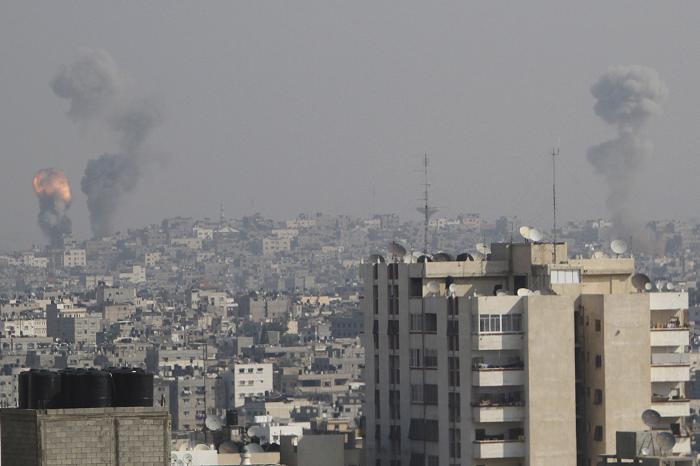Latest NEWS
- Aswat Masriya, the last word
- Roundup of Egypt's press headlines on March 15, 2017
- Roundup of Egypt's press headlines on March 14, 2017
- Former Egyptian President Hosni Mubarak to be released: lawyer
- Roundup of Egypt's press headlines on March 13, 2017
- Egypt's capital set to grow by half a million in 2017
- Egypt's wheat reserves to double with start of harvest -supply min
- Roundup of Egypt's press headlines on March 12, 2017
Updated: Egypt's Mursi says Israel attacks on Gaza "unacceptable"

An explosion and smoke are seen after an Israeli strike in Gaza November 15, 2012. REUTERS/Ali Hassan
CAIRO, Nov 15 (Reuters) - Egyptian President Mohamed Mursi condemned Israeli air strikes on the Gaza Strip as unacceptable on Thursday, in his harshest public criticism of Egypt's neighbour since taking office in June.
Mursi's televised address came as a stand-off deepened between Israel and militant groups in Gaza. A Hamas rocket killed three Israelis north of the Strip and the Palestinian death toll from Israeli attacks rose to 13.
Looking more subdued and downcast than in previous speeches, Mursi looked ill at ease as he listed steps he had taken to recall Egypt's ambassador in Israel and appeal to the United Nations Security Council.
"We are in contact with the people of Gaza and with Palestinians and we stand by them until we stop the aggression," Mursi said. "The Israelis must realise that this aggression is unacceptable and would only lead to instability in the region".
It was the first time Mursi mentioned Israel by name in a public address. Ties between the two neighbours were never warm but have cooled further since Mursi's predecessor Hosni Mubarak, a staunch U.S. ally, was deposed in a street revolt last year.
Israel is wary of the rise of the Muslim Brotherhood, the group that won most seats in post-Mubarak elections and which propelled Mursi to power.
The Brotherhood, which also inspired Hamas, describes Israel as a racist and expansionist state, although Mursi has pledged to respect a three decade-old peace treaty that ended a succession of wars with Israel.
The head of the Brotherhood, the country's most organised group, called on Egyptians to hold protests across the country to support Gaza on Thursday. Protests are also planned for Friday.
Mursi faces an uncomfortable dilemma in his relations with Israel. While keen to acknowledge widespread popular antipathy to the Jewish state, he also needs to persuade Western powers that they need not fear an Egypt governed by Islamists.
Mursi said he had spoken by phone with U.S. President Barack Obama and discussed "ways to reach calm and end the aggression".
He said he told Obama of "how keen we are (to maintain) relations with the United States but also our absolute rejection of this aggression and the spilling of blood and the blockade of Palestinians".
He said U.N. Secretary General Ban Ki-moon had promised to relay his demand for an end to the violence to the Israelis.










